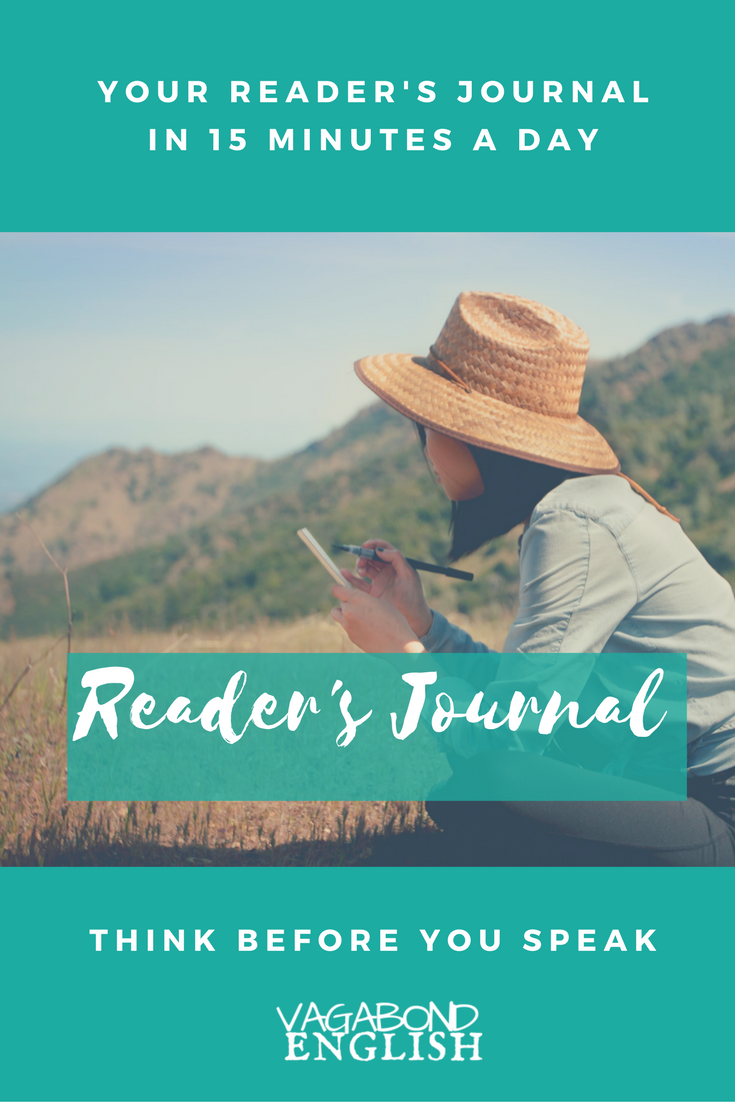“It is what you read when you don’t have to that determines what you will be when you can’t help it.
― Oscar Wilde”
I love this quote. It reminds me that when you take the time to read, and to think things over, it shows up later when you are put to the test. When your English is put to the test.
How can you keep your English ready for new situations? By giving yourself time to think before you speak.
It’s a really powerful way to change your relationship with English (or any language you want to make your own).
If you're a book lover, one of the best ways to prepare for challenges is to read in English--and keep a reader's journal.
Think before you speak: Your reader's journal.
Keep a reader's journal, and the time you put in reading will really show when you express yourself. Here's how:
- Read great books
- Keep a reader's journal: writing freely about what you’ve read or your reactions to your reading,
- Share some of your ideas from time to time (in a conversation, in our Facebook group, on Goodreads.com)
Because thinking before you speak helps ideas come to you that you may never have discovered otherwise. Then it gets you ready to share them in an intelligent manner.
When you need to make a language your own, this time to think on your own really shows.
I find this to be true for me in French, even though I’ve lived in France for over 10 years now.
What about you?
Could you use a little time to think before you speak in English?
Your challenge: a reader's journal in one month (15 minutes a day)
You may be thinking a reading journal is for you, but aren’t sure where to start or what to write.
Or you may have a journal but are wondering if it’s serving you--if it’s helping you with your ideas and your English.
This month, I want to help you get into the habit of keeping a reader's journal. I want to help you use that journal to get the most our of your English.
Each week I'll talk about two things:
A short mission to help you start your reading journal. By the end of a month, if you complete the missions you’ll have a reading journal that will help you reach your goals in English.
The thinking behind your mission--how it helps, why you might want to try it. (If you already know how much keeping a journal matters, maybe you’ll just skip to doing it!! That’s ok too.)
Do you already have an English journal?
That's great! Maybe your journal is a more general one--it's fine to keep that journal and also try some of the reader's journal ideas within that.
And if you already have a journal, I'd love to hear about your own way of doing things.
Just starting your reading habit in English? Check out the free guide.
Four reasons a reader's journal helps your English?
Did you ever notice that knowing why exactly you want to do something (or are doing something) helps you stay with it? I'd like to start by telling you why you need a reader's journal.
Ready to get started right away? You can always skip to this week's mission.
I’m going to talk about 4 big why’s:
Why thinking before you speak is undervalued in many cultures--maybe yours too.
Why thinking before you speak is not the opposite of being spontaneous--it’s the heart of being spontaneous in speaking and writing.
Why repeating the same conversations over and over in English can keep you from thriving in English.
Why keeping a reader’s journal can help you exchange old and tired ways of speaking for an English that is more spontaneous, more "you."
One: Why thinking before you speak is undervalued.
I’m from the US. You can see it in our expressions: we don’t always place value on thinking before we speak. We talk about speaking ‘off the cuff’ or ‘shooting from the hip.’
Both are ways of saying that we improvise, we don’t choose our words. These expressions seem to say that you appear bold, honest, authentic, direct--when you speak quickly, without thinking first.
But when we don’t think first, well, sometimes our words can seem
Thoughtless, reckless, empty, hurtful
Clumsy
You may have already seen this Ted Talk by Susan Cain. It happens to be on the power of introverts, but I’d argue (as does Cain) that anyone can benefit from a chance to think things over before speaking.
More expressions come to mind: "gather your thoughts," "form your words."
Here’s what Cain has to say about time to think before you speak:
“When psychologists look at the lives of the most creative people, what they find are people who are very good at exchanging ideas and advancing ideas, but who also have a serious streak of introversion in them.
And this is because solitude is a crucial ingredient often to creativity.”
And it’s not just about being creative or having better ideas--you’ll find that time to think before you speak will allow you to express yourself better in English.
Two: why thinking before you speak makes you MORE spontaneous.
Here’s a common misconception:
“But wait! You don’t get to rehearse for real life!
Life is spontaneous, conversation is unpredictable and so are the situations we’ll confront. You can’t prepare for that.”
Really?
How many times do we repeat ourselves? So often, it’s just the Same. Old. Conversation.
How about the weather?
What do you do for a living?
Did you catch the game?
Kids these days. . .
These conversations are on autopilot. They just spill out without thought.
No one will ever convince me they are not rehearsed.
They are, in fact, so rehearsed we don’t even think about them anymore.
That’s for native speakers, at least. Sometimes being a non-native speaker of a language or a bilingual gives you a short break from those conversations--in another language, old conversations can seem completely new.
I remember when I first moved to France, that repetition--knowing what was coming next was my salvation.
But then you make the language your own--and you need more.
Three: Why repeating the same conversations keeps your language skills from thriving.
If you’re trying to make a language yours, sticking to the same ideas, the same conversations can hurt your development.
Believe me, I’ve taught a number of English conversation groups and classes, and I’ve noticed that, without interference, people go back to topics they already know, to things they’ve already said. They repeat
The same ideas and topics,
The same words and expressions,
The same mistakes!
Taking the time to read and keep a reader's journal is the perfect way to think before you speak. To be ready for spontaneous conversation.
Four: Think before you speak and watch your English take off
When you read, you open yourself to new ideas, new expressions.
When you write, when you react to what you’ve read, it breaks you out of repeating the same conversation again and again.
Reading confronts you with new ideas, situations, expressions, voices.
Writing about what you’ve read helps even more:
It takes all the new situations and words you found in your reading and cements them in your memory--makes them ready to use.
You get the chance to actually see your language on the page, making you truly aware of the way you speak.
You’ll have a chance to edit out some of those tired ways of speaking that aren't’ really serving you. Those mistakes you make again and again, but can never seem to weed out of your conversation.
And when you get surprised by a new conversation--well, you might be surprised by what you have to say
Your mission, should you choose to accept it:
This week, I invite you to:
Get a journal you like--it can be a simple spiral notebook, large enough to draw in, small enough to carry in your bag. It can be plain or beautiful, ornate. Whatever you think will make you want to open it and write ideally for 10-15 minutes 3-4 times a week.
Connect your journal habit to your reading habit. You already have a reading habit, right? A time when you read? Maybe it’s before bed, during a commute on a bus or train, on your lunch break. Now, whenever you read, just take a few minutes to write afterward.
Write about anything. I'll go into more detail later, but here are some ideas to get you started:
Retell the story.
Describe your personal reaction to what you read--how did you feel about it? Why? What did you think?
Say what this part of the book reminds you of--in your own life, in other reading. . .
Write down your favorite passage/quote from your reading and say why you loved it.
Just write. Don’t worry about grammar, spelling or anything else. . . yet.
Focus on your habit. Later we’ll talk in more detail about what and how to write depending on your goals for your English--for now, every time you write about what you’ve read is a victory.
What’s next?
This week is part one of the reader's journal challenge. Here's where we're going this month
Today's topic: How to get your reader's journal habit in place. (and why)
How to use your reader’s journal for fluency
How to use your reader’s journal for accuracy
Reader’s journal--new, fun and creative ways to challenge yourself and your English with your reader's journal.
Are you someone who thinks before you speak?
You’ll have so many chances to use your voice in English. Maybe you want to express yourself better in conversation or presentations. Or in writing (emails, research, stories. . .tweets).
If you’ve put in the time to think first, what you say will be deeper, more eloquent--and, yes, more grammatically correct.
By the way, I've also taught English to native speakers and I can tell you, the same is true whether English is your first language or not.
Reading, as you know, is a first step in letting yourself think before you speak in English. You’ve probably guessed reading alone can help you improve your English.
But reading and keeping a reader's journal? That will transform your English.
It will help you make English your own.
Questions for you:
Do you live in a culture that values time alone--to read, to write, to think, to meditate. . .
Do you feel pressure to think and speak “on your feet?” or Spontaneously?
Do you keep a journal? Why?
Leave your comments here or stop by the Vagabond Book Club for more discussion.



